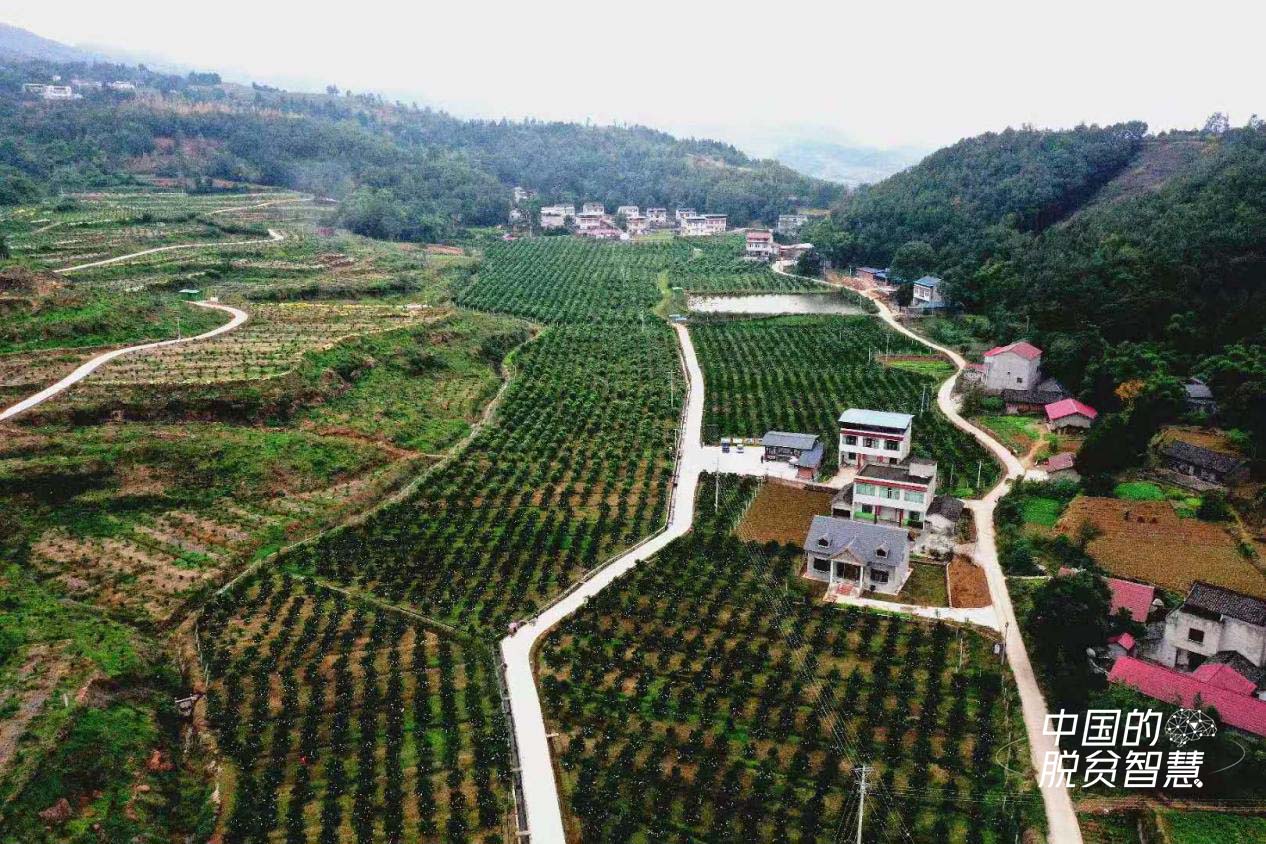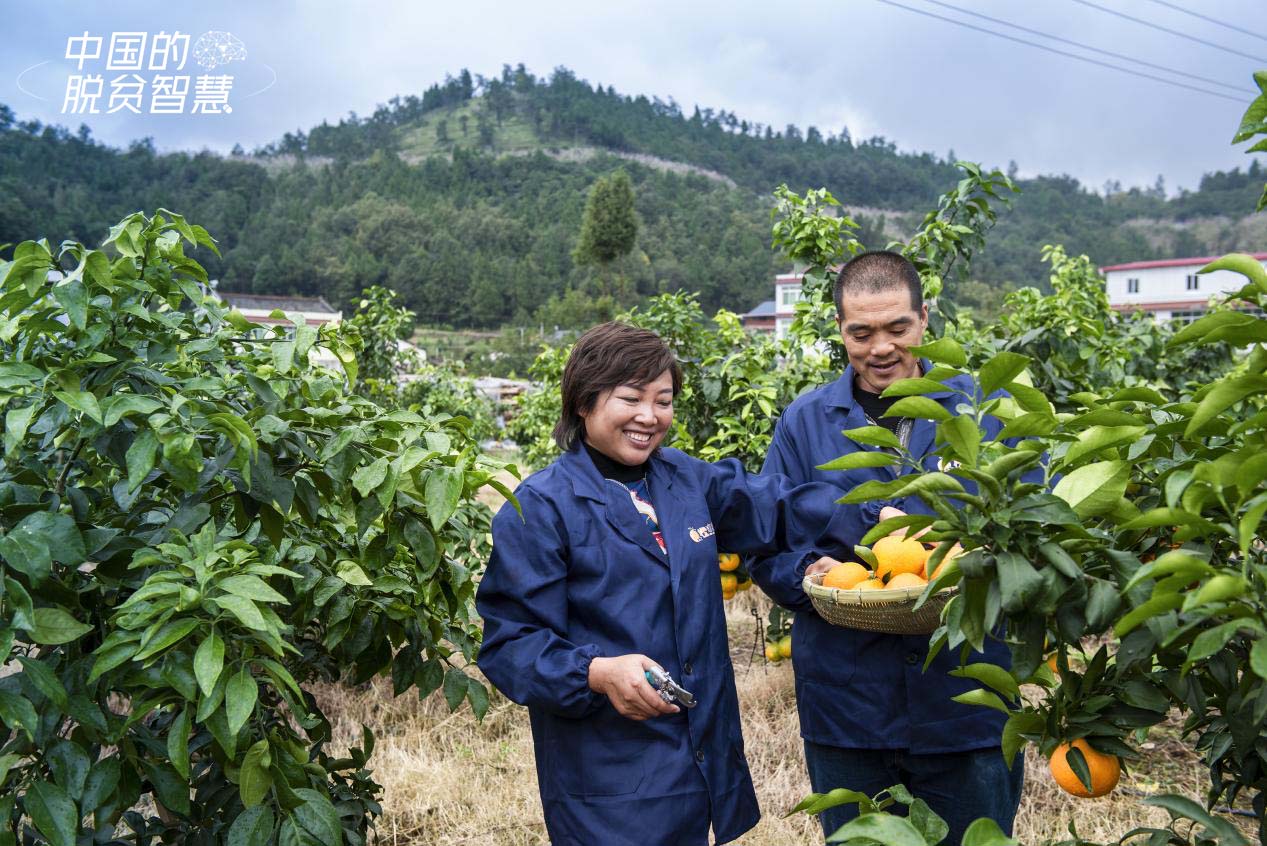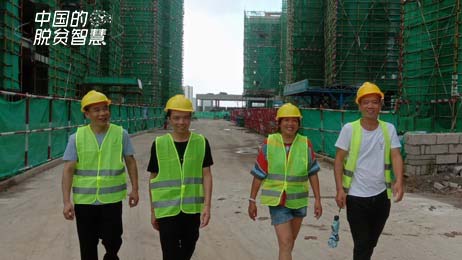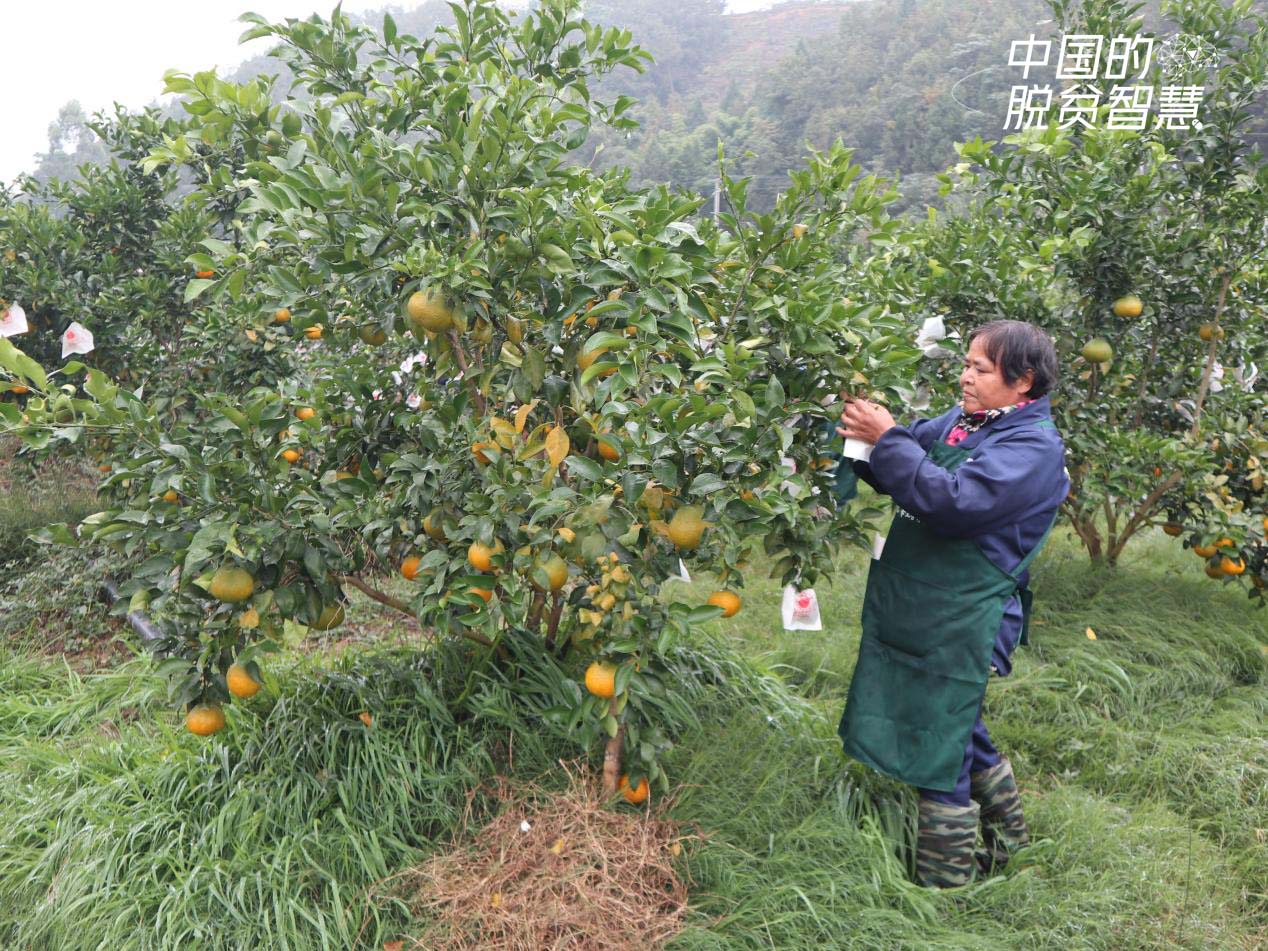[China’s wisdom of getting rid of poverty] "The hometown people are rich when they are rich!" She let the former barren hills float with fruit fragrance.
Cctv news(Reporter Dong Shuyun): Follow the cement road at the foot of the mountain, bypass a pond with a small bend, and then climb several gentle slopes. The fruit trees are everywhere. In the cold early winter in the south, the greenery is not diminished. Fruit farmers are busy, some are putting fruit bags, and some are digging peony roots in the ground.
This is Liuhe Village, Jiqing Town, Zhongjiang County, Sichuan Province. Three years ago, due to too many villagers going out to work, the land here was idle, and the old people who stayed in the village occasionally planted vegetables or some crops with low economic value.
"What a waste of land!" When Tang Wuqiong, who worked in Chengdu for 32 years, returned to the village, she saw that her hometown didn’t seem to have changed much except for some buildings built by villagers. She made up her mind to make use of the land here.

Aerial photography of Liuhe Village (Photo courtesy of Sichuan News Network)
Return home to start a business in the year of no doubt
In April, 2017, Tang Wuqiong leased more than 260 mu of wasteland at the price of 200 yuan per mu, which was planned to be used for interplanting fruits and medicinal materials: planting Paeonia lactiflora under citrus forest, and collecting Paeonia lactiflora in autumn.
For Tang Wuqiong, who has worked in the construction site for more than 30 years, growing fruits and medicinal materials almost started from scratch. At that time, she faced more unknowns than that.
Liuhe Village is located in a shallow hilly area, with criss-crossing ditches and rivers and weak transportation infrastructure. It is difficult for Tang Wuqiong to transport the seedlings and organic fertilizers he needs into the village. The several hundred mu of land she rented is located at the junction of Group 6 and Group 7, which was originally called "Mud Pond". Tang Wuqiong clearly remembers that she hired six excavators to work day and night for three months in order to clear the mud and lay soil for the Mud Pond.

Tang Wuqiong (first from left) picks oranges in the orchard (photo courtesy of the interviewee)
In recent years, the state has vigorously supported agriculture and encouraged migrant workers to return to their hometowns to start businesses. Tang Wuqiong’s return to his hometown to start businesses has also received the full support of the local government. After the upgrading of the village road, the local government invested more than 1 million yuan for Tang Wuqiong to return to her hometown to rebuild the People’s Canal and Lubangou on the hillside, so that she could use Dujiangyan water to irrigate the forest land.
"At the beginning, it was very painful. I didn’t know anything. I had no experience in cultivating fruit trees and managing orchards." Tang Wuqiong can only learn while doing. First, he went to Wuming, Nanning to learn citrus cultivation techniques, then introduced new varieties to Japan, and went to Pujiang, Danling and other "fruit towns" to learn from the classics every week when he was not busy.
After three years of careful management, Tang Wuqiong’s plantation has gradually entered a benign development period. "The yield per mu of citrus is about 6,000 Jin, and the annual output is about 3 million Jin." According to Tang Wuqiong, in the flowering season, there are 3,000 to 5,000 peonies interplanted under the forest, and the average selling price is per 2 yuan. After deep processing, they are sold to the Middle East.
Drive hundreds of people out of poverty and run for health
In 2018, Tang Wuqiong learned that all parts of Sichuan were actively building oil-tea bases, and did not hesitate to strive for the renovation project of low hills and hills. He planned to lease more than 400 acres of barren hills to plant oil-tea and peony under the forest.
"Qian Shan is full of love, and the hometown people are rich when they are rich." Looking back at Tang Wuqiong’s dream of starting a business and getting rich, she always said so.
In addition to promoting agricultural production by leasing barren hills, Tang Wuqiong also hired local people to do planting and management work and provide them with employment opportunities. For the villagers who love planting, she also teaches planting experience without reservation and provides technical guidance to local people free of charge.
Busy in the fields are all elderly people in their fifties and sixties. Looking at them busy in the fields, Tang Wuqiong’s eyes become gentle.
"Look at these old people. Some children can earn money outside and get it back. Some don’t earn money, and there is no money when they come back. Old people have to grow food at home before they can have money and buy what they want." Tang Wuqiong said that the happiest time was when she paid her employees, which led them to increase their income, which gave her a sense of accomplishment. At present, there are 18 poor households in the orchard, and the land of more than 300 villagers has been transferred, driving hundreds of people out of poverty.

Villagers dig peony at the planting base (photo: CCTV reporter Dong Shuyun)
These villagers are no longer competitive when they go out to work. They are now working in the planting base of Tang Wuqiong, and they can get more than 1,000 yuan a month as labor remuneration, and they can also look after the house and take care of the children. Tang Wuqiong certainly hopes that they can work in the base for a long time, but the labor force in the village is still too scarce.
It is estimated that in a few years, Tang Wuqiong’s citrus, camellia oleifera and peony under the forest will bring in an average annual income of more than one million yuan, which will solve the problems of increasing the income of more poor local households and the left-behind workers, and she also hopes that more villagers who go out to work will return to their hometowns and make money at home.
Work hard and make a way to get rich
Three years ago, when Tang Wuqiong decided to return to her hometown to start a business, her family was not optimistic, and even said that she was "crazy". Now, seeing that the original small branches have grown into such a big tree, and seeing that oranges are covered with branches, the land that was originally abandoned and idle has now produced rich fruits. Tang Wuqiong’s "tossing" has finally been understood and recognized by his family.
Tang Wuqiong once again used her efforts to prove that with a drive of being unwilling to be poor and unwilling to admit defeat, and with hard work and intelligence, she can definitely break out of her own path.
Back in 1990, after graduating from Jiqing Town Middle School, Tang Wuqiong went home to farm, and a family of several people barely made ends meet by planting a few acres of land.
At that time, only during the Chinese New Year could we eat several meals of flour and rice, eat meat and buy coarse clothes. Planting those acres of land with her father, she always felt that she couldn’t make it, and she always felt that life had nothing to look forward to. Therefore, Tang Wuqiong secretly vowed: "You can’t just keep a few acres of land at home and live a poor and rich life. You must do something and earn some money to change the real life in front of you!"

Photo of Tang Wuqiong at the construction site (Photo courtesy of the interviewee)
Finally, she made the first decision of her own ―― to go to Chengdu and join the tide of working. In a strange place, Chengdu, with no skills and no experience, lost day by day, went to a construction site after many twists and turns, followed by a paint master, and started a part-time job in paint construction.
In 1992, "restless", she decided to contract the paint double-package project on the construction site, but it backfired. When Tang Wuqiong returned to her hometown, she couldn’t find any workers, and no one around her believed that she could get the project alone. At that time, her mood suddenly fell into a trough.
However, Tang Wuqiong was unwilling, and went door to door to talk about the future, the future and the change. Finally, a dozen neighbors and relatives held the idea of giving it a try and promised to follow Tang Wuqiong to the construction site to have a look.
So she led a dozen people, including relatives and friends from her hometown, to form a building decoration team and enter the provincial capital, and embarked on a long road of working in paint construction. She constantly undertakes business, and in a few years, this team has grown into a construction team of more than 200 people.

Villagers set fruit bags in orchards (photo: CCTV reporter Dong Shuyun)
More than 30 years have passed, from the construction team "changing careers" to planting fruit trees and managing orchards, Tang Wuqiong is still so determined about what he sees, and by his indomitable efforts, he has become a veritable local rich man.
"People should pursue a little in this life. When I am poor, I pursue a rich life, and I have achieved this goal. When I am rich, I have nothing to eat and wear at home, but I always feel that there is something missing, and I often feel a sense of loss in my heart. "
Hard work has made Tang Wuqiong lead the people to get rich in a particularly flat and long way. Nowadays, citrus and peony seedlings are everywhere in full of green under the warm sun, and the barren hills and thin fields in previous years have also turned into Jinshan Yinshan. The fragrance of the fruit may be the taste of the villagers’ happy life … …